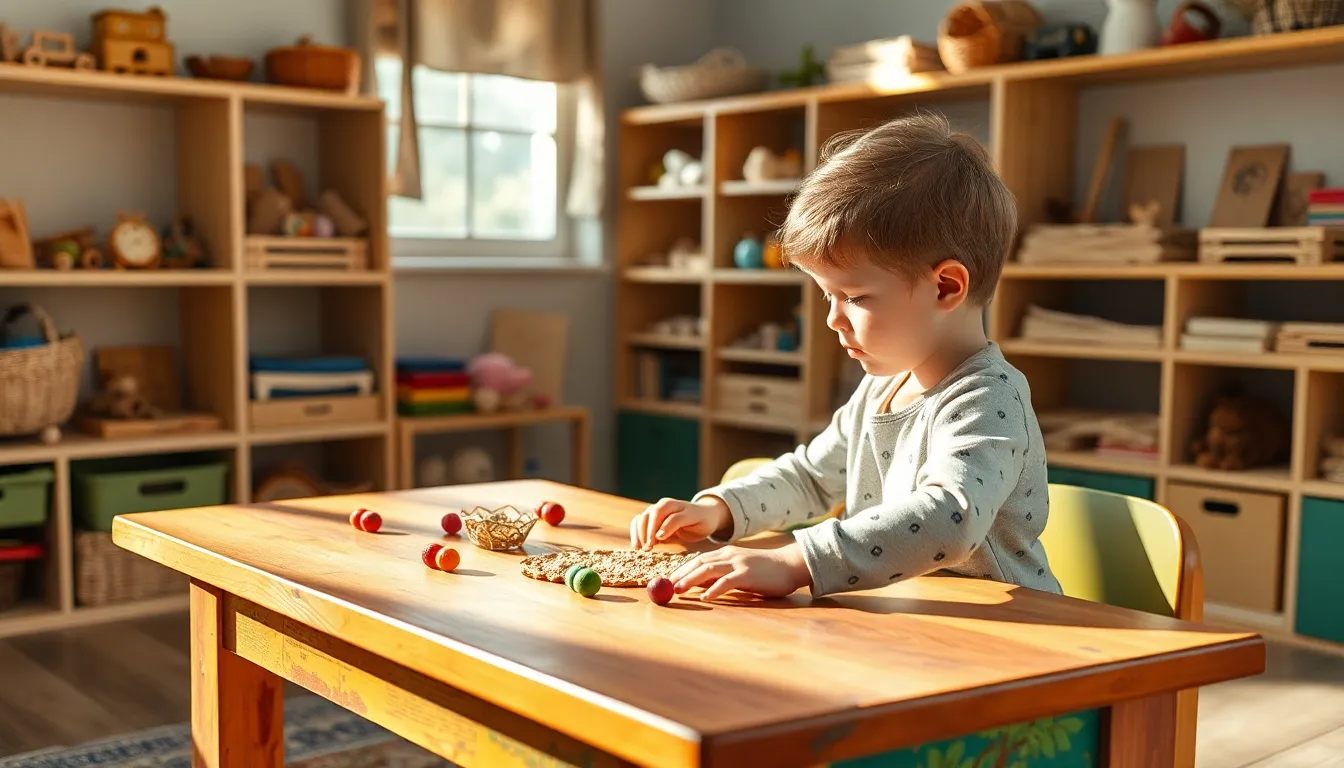In a world where parenting advice often feels like a game of “guess who,” Montessori parenting stands out as a refreshing approach that’s both engaging and effective. Imagine a method where kids learn through exploration and curiosity, rather than just memorizing facts. It’s like giving them the keys to a treasure chest of knowledge, and they get to pick which gems to explore first.
Montessori parenting isn’t just about letting kids run wild; it’s about creating an environment that encourages independence and critical thinking. Think of it as a parenting hack that transforms everyday moments into valuable learning experiences. With a sprinkle of creativity and a dash of patience, parents can foster a love for learning that lasts a lifetime. So, if you’re ready to trade in the traditional parenting playbook for something a bit more adventurous, dive into the world of Montessori and watch your little ones thrive.
Table of Contents
ToggleWhat Is Montessori Parenting?
Montessori parenting is an innovative approach that promotes children’s natural development through freedom and exploration. Parents using this method foster independence, critical thinking, and a deep love for learning.
Key Principles of Montessori Approach
Child-led learning sits at the heart of the Montessori approach. Environments encourage autonomy, allowing children to choose activities that interest them. Hands-on experiences enhance understanding and retention. Respect for each child’s unique development path ensures that learning progresses at an individual pace. Curiosity drives the exploration of ideas with minimal adult intervention.
Benefits of Montessori Parenting
Parents observing Montessori principles often see increased independence in their children. Enhanced problem-solving skills develop as children engage in hands-on learning. Greater confidence emerges when children actively participate in decision-making. Improved social skills result from collaborative play and group activities. Lifelong learning habits are fostered, creating a foundation for future educational pursuits.
Implementing Montessori Parenting at Home

Implementing Montessori parenting at home involves creating supportive spaces and fostering skills in children. This approach encourages children to thrive through independence and active engagement.
Creating a Prepared Environment
A prepared environment maximizes learning opportunities. Organizing materials ensures accessibility, allowing children to freely choose activities. Furniture should fit children’s sizes, which promotes comfort and encourages them to explore. Age-appropriate tools and toys enhance hands-on experiences that deepen understanding. Including natural, open-ended materials further sparks creativity. Designating specific areas for various activities creates structure, helping children to focus. Consistent organization reinforces routines, making it easier for children to learn and grow.
Encouraging Independence
Encouraging independence starts with simple chores. Assigning age-appropriate tasks builds confidence and responsibility. Letting children make choices prompts critical thinking and decision-making skills. Offering guidance rather than solving problems fosters resilience and perseverance. Establishing routines helps children feel secure while they navigate daily activities. Praise efforts and celebrate accomplishments, reinforcing the value of trying new things. Allowing mistakes transforms learning into a positive experience, giving children the chance to adapt and improve. Encouraging self-care routines supports autonomy, promoting a sense of competence and independence.
Montessori Parenting in Everyday Life
Montessori parenting brings daily learning opportunities through exploration and independence. Engaging children in practical activities enhances their development while providing meaningful experiences.
Practical Activities for Children
Incorporating everyday tasks fosters responsibility. Cooking together creates a fun learning environment where children grasp measurements and follow instructions. Gardening offers hands-on experiences that enhance respect for nature and help children understand the lifecycle of plants. Simple chores like dusting or sorting laundry promote motor skills while instilling a sense of accomplishment. Encouraging creative play, such as building with blocks or drawing, nurtures imagination and critical thinking. Real-world tasks transform mundane moments into enriching lessons.
Integrating Montessori Principles in Routine
Structuring daily routines around Montessori principles cultivates independence. Allowing children to select their clothes empowers them to express personal style and makes decision-making a daily practice. Setting up a dedicated space for activities supports focus, letting children engage with materials that interest them. Integrating moments of reflection into bedtime routines encourages emotional awareness, promoting self-assessment. Regularly rotating toys and books keeps the environment fresh, stimulating curiosity and exploration. Simple schedules help children anticipate transitions, reinforcing a sense of security and organization.
Challenges of Montessori Parenting
Montessori parenting presents unique challenges that parents navigate as they adopt this educational approach. Understanding these difficulties helps create a supportive environment for both the parent and child.
Common Misconceptions
Many people believe Montessori methods lack structure. Contrary to this belief, the approach relies on guided freedom within an organized environment. Some think only expensive materials are effective, but simple, everyday items can facilitate learning. Others assume that Montessori parenting promotes child-centric indulgence, while in reality, it emphasizes discipline and responsibility alongside independence. Misunderstanding the method often leads to frustration instead of embracing its benefits.
Overcoming Obstacles
Overcoming obstacles in Montessori parenting involves commitment and adaptability. Parents can face societal pressure to conform to traditional methods, making it important to stay focused on their child’s individual needs. Finding resources, like local Montessori communities, encourages collaboration and support. Balancing freedom with boundaries remains crucial for guiding children effectively. Emphasizing routine and structure helps cultivate an environment conducive to learning. Implementing consistent family practices bridges gaps and reinforces Montessori principles in everyday life.
Montessori parenting offers a transformative approach that nurtures children’s natural curiosity and independence. By creating a prepared environment and encouraging child-led learning, parents can foster essential skills that last a lifetime. This method not only enhances problem-solving abilities and confidence but also instills a deep respect for the learning process itself.
Embracing Montessori principles in everyday life can lead to enriching experiences that promote growth and resilience. While challenges may arise, the rewards of cultivating a love for learning in children are immeasurable. With commitment and creativity, parents can navigate this journey and witness their children thrive in a supportive and empowering atmosphere.



